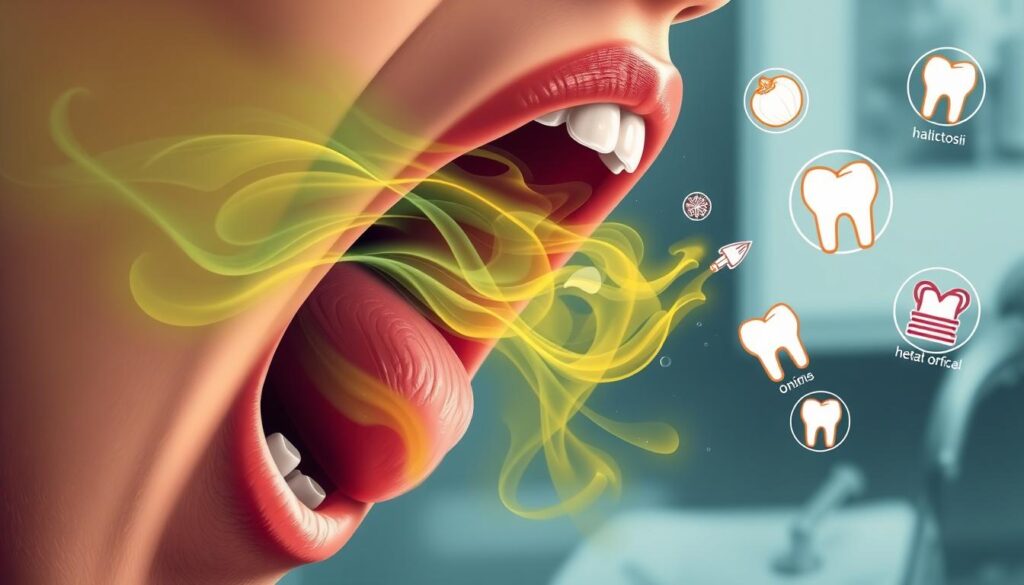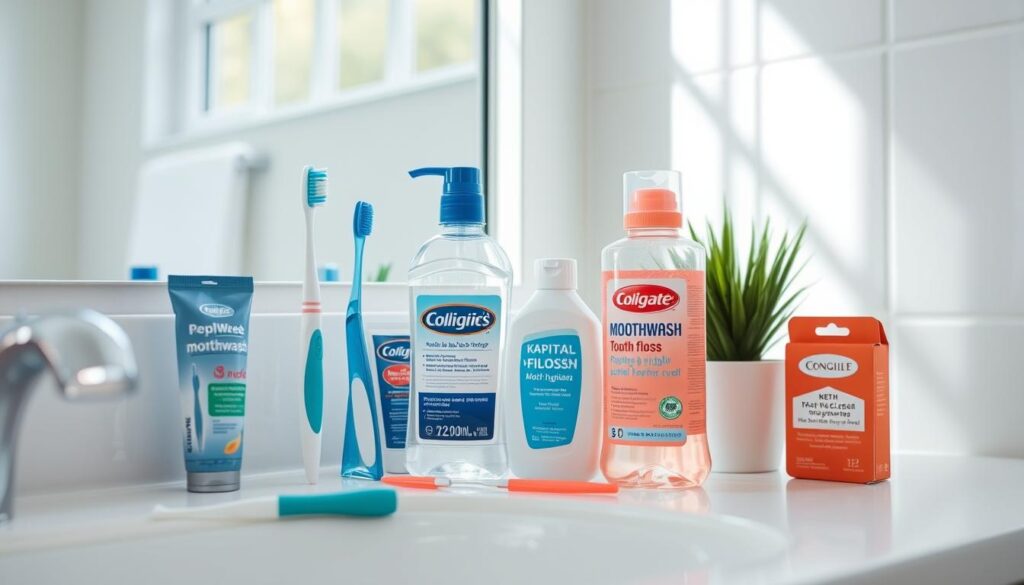Did you know over 50% of people worldwide suffer from chronic bad breath, or halitosis? This common problem can hurt personal and social relationships. It might also signal health issues. It’s important to understand and treat halitosis to keep our mouths and bodies healthy.

In this guide, we’ll explore halitosis in detail. We’ll look at its causes, how it affects our lives, and the latest treatments. By the end, you’ll know how to fight bad breath and feel confident again.
Key Takeaways
- Halitosis, or chronic bad breath, affects over 50% of the global population.
- Bad breath can have a significant impact on personal relationships and social interactions.
- Identifying the underlying causes of halitosis is crucial for effective treatment.
- Both medical and natural remedies are available to combat bad breath.
- Maintaining proper oral hygiene is essential for preventing and managing halitosis.
Understanding Halitosis: A Comprehensive Overview
Halitosis, or bad breath, affects millions globally. It ranges from short-term morning breath to long-lasting chronic halitosis. Knowing the types of bad breath and their effects is key to tackling this common issue.
Types of Bad Breath
There are two main types of bad breath: transient and chronic. Transient bad breath comes from foods like garlic and onions and goes away in hours. Chronic halitosis, however, lasts all day and can hurt your social life and self-confidence.
Impact on Daily Life
Chronic bad breath can deeply affect your daily life. It can make you feel shy, anxious, and avoid social situations. This can harm your personal and work relationships and lower your overall happiness.
Common Misconceptions
Many people with bad breath have wrong ideas about it. They might think it’s only because of bad oral hygiene or that brushing more will fix it. But bad breath can come from health issues and lifestyle choices, not just how clean your mouth is.
“Halitosis is a complex condition that requires a comprehensive understanding to effectively manage and prevent.”
The Science Behind Bad Breath Formation
Halitosis, or chronic bad breath, is a common issue that affects millions of people worldwide. Understanding the science behind bad breath is key to addressing it. At the heart of bad breath are volatile sulfur compounds (VSCs) made by certain bacteria in the mouth.
The human mouth is a home to many microorganisms, both good and bad. When certain bacteria, like anaerobic ones, break down food and proteins, they make VSCs. These include hydrogen sulfide, methyl mercaptan, and dimethyl sulfide. These compounds are the main reason for the bad smell of halitosis.
The amount and activity of these bacteria can change due to many factors. These include poor oral hygiene, food debris, and some medical conditions. Knowing how VSCs are made is the first step to fighting halitosis and oral malodor.
By tackling the causes of VSC production and keeping good oral hygiene, we can prevent and manage bad breath. Using this knowledge in oral health can lead to lasting solutions. It can greatly improve the lives of those dealing with this common but treatable condition.
Primary Causes of Oral Malodor
It’s important to know why we get bad breath to treat and prevent it. Bad breath comes from three main sources: bacteria, food, and health issues.
Bacterial Growth and VSCs
Bacteria in our mouths are a big reason for bad breath. These bacteria make gases that smell bad. Not brushing well, plaque, and not enough saliva help these bacteria grow.
Food-Related Causes
Some foods and drinks can make our breath smell bad. Foods like garlic and onions can stay in our mouths and make bad breath. Also, breaking down proteins in foods like meat can release bad-smelling gases.
Medical Conditions
Health problems can also cause bad breath. Issues like infections, stomach problems, and diseases can make our breath smell. Finding and treating these health issues is key to stopping bad breath.
Knowing what causes bad breath helps us fight it. We can improve our mouth health and feel better by tackling these causes.
Poor Oral Hygiene and its Connection to Bad Breath
Keeping your mouth clean is key to avoiding bad breath. Not brushing, flossing, or cleaning your tongue well lets bacteria grow. This growth leads to bad smells from volatile sulfur compounds (VSCs).
Good oral care is the first step against bad breath. Brushing your teeth twice a day for two minutes removes food and plaque. Flossing daily is also important, as it reaches areas your toothbrush can’t.
- Proper brushing technique, including gentle circular motions and thorough cleaning of all surfaces, is key.
- Flossing helps remove food debris and plaque that contribute to halitosis causes.
- Cleaning the tongue with a scraper or brush can eliminate additional sources of oral bacteria.
Regular dental visits and cleanings are also vital. They help catch and fix problems like tooth decay or gum disease. Dentists can find and treat the main causes of bad breath.
| Oral Hygiene Practice | Frequency | Benefits for Halitosis Prevention |
|---|---|---|
| Brushing | Twice a day, 2 minutes each time | Removes food particles and plaque, reducing bacterial growth |
| Flossing | Once a day | Cleans between teeth where a toothbrush can’t reach |
| Tongue Cleaning | Once a day | Eliminates additional sources of oral bacteria |
| Professional Dental Cleanings | Every 6 months | Addresses underlying oral health issues that contribute to halitosis |
By focusing on good oral hygiene and dental care, you can fight bad breath. This way, you can keep your breath fresh and confident all day.

Medical Conditions That Trigger Halitosis
Chronic halitosis, or bad breath, often comes from health problems. Knowing how some illnesses cause halitosis causes helps solve the issue. Let’s look at some major health issues that can lead to bad breath.
Respiratory Tract Infections
Respiratory infections like sinusitis, tonsillitis, or bronchitis can cause bad breath. These infections make more mucus, which bacteria in the mouth and throat can grow on.
Gastrointestinal Issues
Gastrointestinal problems, like acid reflux, peptic ulcers, and some cancers, can also cause bad breath. When stomach contents come up, they bring sulfur compounds into the mouth, making it smell bad.
Systemic Diseases
Diseases like diabetes, liver disease, and kidney disease can lead to chronic halitosis. These conditions change how the body works, leading to compounds that smell bad when we breathe out.
It’s key to know the medical reasons for bad breath to fix it. Working with doctors to find and treat health problems helps get rid of chronic halitosis for good.
Lifestyle Factors Contributing to Bad Breath
Poor oral hygiene is a big reason for bad breath, or halitosis. But, lifestyle choices also matter. Some habits and foods can make bad breath worse.
Smoking is a major cause of bad breath. Tobacco dries out the mouth, which stops saliva from cleaning away bacteria. The smoke itself also stays in the mouth and throat, making breath smell worse.
Drinking too much alcohol can dry out the mouth and reduce saliva. This makes it easier for bacteria to grow. Some drinks, like beer and wine, can also leave smells in the mouth.
The foods we eat can affect our breath too. Garlic, onions, and spices can make bad smells. Even healthy foods can cause bad breath because of how they break down in our bodies.
| Lifestyle Factor | Impact on Breath |
|---|---|
| Smoking | Dries out the mouth, inhibits saliva production, and traps odor-causing chemicals |
| Alcohol Consumption | Leads to dehydration and reduced saliva flow, allowing bacteria to thrive |
| Certain Foods | Garlic, onions, and spices can produce strong, lingering odors |
Knowing how lifestyle choices can lead to bad breath helps us fight it. We can take steps to keep our breath fresh and confident.
Diagnosing Chronic Halitosis
Finding the cause of chronic halitosis is key to treating it. Luckily, there are many ways to check for bad breath. Both doctors and individuals can use these methods.
Professional Assessment Methods
Dentists or doctors use different ways to check for chronic halitosis. They might:
- Use organoleptic testing to smell a patient’s breath.
- Take readings with a Halimeter to measure sulfur compounds.
- Look at oral bacteria to find the cause of halitosis.
Self-Assessment Techniques
People worried about their breath can check themselves too. Here are some ways:
- Lick the back of your hand, let it dry, and smell it for bad smells.
- Use a halitosis test kit to see how bad your breath is.
- Ask someone you trust if your breath smells bad.
Knowing how to check for chronic halitosis helps fight it. It’s a step towards better oral health.
Professional Treatment Options
If you have chronic bad breath, there are professional treatments to help. These treatments are designed by experts to tackle the root causes. They aim to provide lasting relief from this common issue.
A thorough dental cleaning is a key treatment for bad breath. Dentists remove plaque and tartar, which can cause bad smells. They also suggest products or methods to keep your mouth clean and prevent future bad breath.
Medical conditions can also cause bad breath. Doctors may give medicines or refer you to specialists. Treating these conditions can help get rid of bad breath.
For bad breath that doesn’t go away with regular care, there are special treatments. These include mouthwashes and lozenges made to fight bad breath bacteria. Getting the right treatment is important, and a professional can help choose the best one for you.
| Professional Treatment Options | Description |
|---|---|
| Dental Cleaning and Examination | Removal of plaque and tartar buildup to eliminate odor-causing bacteria |
| Prescription Medications | Treatment for underlying medical conditions contributing to halitosis |
| Specialized Halitosis Products | Mouthwashes, lozenges, and other oral care items formulated to target the source of bad breath |
It’s important to work with dental and medical experts for lasting solutions. They can help you manage halitosis treatment and bad breath. With the right treatment, you can feel more confident and improve your life.

Natural Remedies for Bad Breath
If you’re dealing with bad breath, there are natural ways to help. These methods use herbs and changes in what you eat. They can tackle the main reasons for bad breath.
Herbal Solutions
Many herbs and essential oils can make your breath smell better. They fight the bacteria that cause bad breath. Here are some herbs that can help:
- Peppermint: It’s refreshing and fights bacteria, making your breath smell better.
- Cloves: They have eugenol, which fights germs and reduces bad breath.
- Parsley: It’s full of chlorophyll, which can get rid of bad breath.
- Thyme: Thymol in thyme stops bacteria that cause bad breath.
Dietary Modifications
Changing what you eat can also help with bad breath. Try these diet changes:
- Drink more water to keep your mouth moist, which helps prevent bad breath.
- Eat less garlic, onions, and other strong foods that can make your breath smell.
- Eat crunchy fruits and veggies like apples, carrots, and celery. They clean your teeth and freshen your breath.
- Add foods rich in probiotics, like yogurt or kefir. They help keep your mouth healthy and reduce bad breath bacteria.
By trying these natural remedies and making some lifestyle changes, you can manage bad breath. This will help you feel more confident about your breath.
Essential Oral Hygiene Practices
Keeping your mouth clean is key to avoiding halitosis, or bad breath. Simple habits can greatly improve your oral health and cut down on bad smells.
Brushing your teeth regularly is the first step. Do it twice a day, in the morning and before bed. Use a soft-bristled toothbrush and toothpaste with fluoride. Make sure to brush every part of your teeth for at least two minutes.
Flossing is also vital. Floss once a day to get rid of food and plaque your toothbrush misses. This helps stop bacteria that cause halitosis.
Cleaning your tongue is important but often forgotten. Use a tongue scraper or your toothbrush to remove bacteria and debris from your tongue.
Using an antibacterial mouthwash can also boost your oral care. Mouthwash helps kill bacteria that cause bad breath and leaves your mouth feeling clean.
Stick to these essential oral hygiene practices to prevent and manage halitosis. This will keep your breath fresh and your mouth healthy.
| Oral Hygiene Practice | Benefits for Halitosis Prevention |
|---|---|
| Brushing Teeth | Removes plaque and bacteria that contribute to bad breath |
| Flossing | Dislodges food particles and plaque between teeth |
| Tongue Cleaning | Reduces the buildup of bacteria and debris on the tongue |
| Antibacterial Mouthwash | Kills odor-causing bacteria and freshens breath |
Prevention Strategies for Long-term Success
To keep your breath fresh and your mouth healthy, you need a complete plan. By doing certain things every day and making lifestyle changes, you can stop bad breath and keep your mouth clean. Let’s look at some important ways to prevent halitosis.
Daily Habits
Good oral hygiene is key to avoiding bad breath. Make these habits a part of your daily life:
- Brush your teeth twice a day, for at least two minutes each time, with a soft-bristled toothbrush and fluoride toothpaste.
- Floss every day to get rid of food and plaque in hard spots.
- Use an antibacterial mouthwash to kill bacteria that cause bad breath.
- Scrape your tongue often to remove VSCs that cause bad breath.
- Drink lots of water all day to stay hydrated.
Lifestyle Changes
Changing your lifestyle can also help prevent bad breath:
- Dietary Modifications: Stay away from foods like garlic, onions, coffee, and sweets. Eat more fruits, veggies, and dairy instead.
- Stress Management: Stress can mess with your mouth’s bacteria balance, leading to bad breath. Try meditation, yoga, or deep breathing to relax.
- Quit Smoking: Smoking is a big reason for bad breath. Quitting can greatly improve your breath and mouth health.
By adding these prevention strategies to your daily routine, you can fight bad breath and keep a healthy, fresh smile for a long time.
When to Seek Professional Help
Persistent or chronic halitosis might mean there’s a health issue that needs a doctor. While sometimes bad breath can be fixed with better oral care, other times it’s a sign of something bigger. If you can’t get rid of bad breath, it’s time to see a dentist or doctor.
Also, if bad breath keeps coming back even after you’ve tried everything, it’s a sign to get help. If you’ve cleaned your teeth well and still have bad breath, it’s best to talk to a dentist or doctor.
Other symptoms that might mean you need to see a doctor include:
- Persistent dry mouth
- Difficulty swallowing
- Unexplained taste or smell changes
- Chronic sinus or respiratory issues
- Unexplained weight loss
These symptoms could point to a serious health issue. Getting medical help quickly is important. It can help find and fix the problem and treat the bad breath.
| Symptom | Potential Underlying Cause |
|---|---|
| Persistent dry mouth | Salivary gland dysfunction, certain medications |
| Difficulty swallowing | Throat or esophageal issues |
| Unexplained taste or smell changes | Neurological or sinus-related problems |
| Chronic sinus or respiratory issues | Sinus infections, respiratory tract infections |
| Unexplained weight loss | Gastrointestinal disorders, systemic diseases |
Getting help for persistent or bad chronic halitosis is key. It helps get the right diagnosis and treatment. Don’t wait to see a healthcare provider for your oral and overall health.

The Psychological Impact of Chronic Bad Breath
Dealing with chronic halitosis, or long-lasting bad breath, deeply affects people’s minds. It can hurt their self-esteem, how they interact with others, and their life quality.
Chronic halitosis can really knock down a person’s confidence. Those with bad breath might feel too self-conscious. This can make them pull back from social scenes and avoid being close to others.
This situation can make people feel isolated and less worthy. It’s a big problem.
Also, chronic halitosis can mess up social relationships. The fear of making others uncomfortable or being seen as dirty can stop people from talking and connecting. This leads to social anxiety and makes it hard to join in on social events.
“The psychological burden of chronic halitosis cannot be overstated. It can profoundly impact a person’s sense of self-worth and their ability to maintain healthy relationships.”
To tackle the mental side of chronic halitosis, getting professional help is key. A dentist or healthcare provider can find the root cause and create a treatment plan. Mental health experts can also offer ways to cope and boost confidence and social skills.
By tackling both the physical and mental sides of chronic halitosis, people can take back control. Medical treatment, lifestyle changes, and emotional support can help those with bad breath regain confidence and reconnect with others.
Conclusion
Halitosis, or chronic bad breath, affects many people and can impact their social and personal lives. This article has covered the causes and treatments for oral malodor. It shows how bad breath can affect us and what we can do about it.
We’ve learned about the science behind bad breath and what causes it. This includes bacteria, diet, and health issues. Keeping our mouths clean, changing our lifestyle, and getting help when needed are key.
We want to help people manage their bad breath and feel better about themselves. Dealing with bad breath is important for our health and happiness. Use the tips from this article to improve your oral health and smile brighter.
FAQ
Q: What is halitosis?
A: Halitosis is another name for bad breath that lasts a long time. It’s a common issue that can affect many people. It can also impact their social and personal lives a lot.
Q: What are the main causes of halitosis?
A: Bad breath often comes from bacteria in the mouth. It can also be caused by food like garlic and onions. Medical issues like infections and diseases can also play a role.
Q: How does poor oral hygiene contribute to bad breath?
A: Not brushing, flossing, and cleaning your tongue well can lead to bad breath. This is because bacteria build up and release gases that smell bad. Keeping your mouth clean is key to avoiding bad breath.
Q: What are some medical conditions that can cause halitosis?
A: Certain health problems can cause bad breath. These include infections in the respiratory tract and stomach issues. Diseases like diabetes and kidney disease can also cause it.
Q: How can lifestyle factors contribute to bad breath?
A: Lifestyle choices can also lead to bad breath. Smoking, drinking too much alcohol, and certain foods can harm your oral health. This can make your breath smell bad.
Q: How can I diagnose chronic halitosis?
A: A dentist or doctor can diagnose chronic bad breath. They might use special tests or ask for your feedback. You can also try the “wrist test” or ask a friend about your breath.
Q: What are the treatment options for halitosis?
A: There are many ways to treat bad breath. Dental procedures, medicines, and products like tongue scrapers can help. Natural remedies and changing your diet are also options. It’s important to work with a healthcare professional to find the right treatment.
Q: How can I prevent bad breath in the long term?
A: Good oral hygiene is key to preventing bad breath. Brush, floss, and clean your tongue well. Quit smoking and avoid certain foods. Regular dental visits and managing health issues are also important.
Q: When should I seek professional help for chronic bad breath?
A: If bad breath doesn’t get better with good oral hygiene, see a dentist or doctor. They can find the cause and help you get better.
Q: How does chronic bad breath impact mental health and quality of life?
A: Bad breath can really affect your self-esteem and social life. It can make you feel embarrassed and anxious. Getting help for the emotional side of bad breath is important for your well-being.
